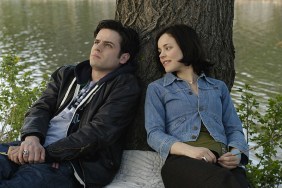Isabella Rossellini as Lady Port-Huntley
Mark McKinney as Chester
Maria de Medeiros as Narcissa
Ross McMillan as Roderick
David Fox as Fyodor
Claude Dorge as Duncan
Darcy Fehr as Teddy
Erik J. Berg as Orphan
Story:
During the Great Depression of 1933, Winnipeg beer baroness Lady Port-Huntley (Rossellini) takes advantage of the situation by holding a contest to find the saddest music in the world with a prize of $25,000 going to the winner. At the center of the competition is her former lover, Broadway producer Chester Kent (McKinney), his dour cello-playing brother Roderick (McMillan), and their alcoholic father, a doctor who accidentally amputated both of Lady Port-Huntley’s legs years earlier. The family squabble reaches a feverish pitch as they fight for the prize and the affections of Lady Port-Huntley and a nutty nympho named Narcissa (Maria de Medeiros)
Analysis:
As one might expect from reading the above synopsis, the latest movie from Canadian avant-garde director Guy Maddin is a strange puppy.
Based on a screenplay by Kazuo Ishigur, author of “The Remains of the Day”, The Saddest Music in the World is shot mostly in black and white to resemble the movies of the 30’s. It’s a drama about a dysfunctional dual love triangle between a father, his two sons, and the women that come between them, combined with an outlandish premise, creating an eclectic mixture that will remind some of David Lynch’s weirder movies like Eraserhead.
At the center of the story is the relationship between Chester, the born showman played with wit and charm by Mark McKinney of “The Kids in the Hall”, and his dour brother Roderick, who mopes about his missing wife and his dead son whose heart he carries around in a jar. Though both have faced hardships, they deal with them in different enough ways to cause constant friction between them. This drama plays out in the middle of a bizarre song contest with Chester representing America with lavish musical numbers that aren’t particularly sad, and Roderick playing a depressing cello tune.
While the premise might seem straightforward, the movie is surreal and so weird at times that it’s uncomfortable to watch. At first, this seems like a pleasant 30’s retro-musical drama, but ten minutes into the film, the amputation of Lady Port-Huntley’s legs is shown in its gory detail and you realize that this is not going to be Moulin Rouge. The black and white helps to soften the blow, but it’s pretty gruesome, and things just get stranger and stranger as the relationships crumble. By the time Chester’s crazy father presents Lady Port-Huntley with a set of glass legs-filled to the brim with beer, no less-as recompense for his earlier error, there is no going back, and you’re not sure whether to laugh or cry.
The bizarre story is not helped by a cast of character so strange and unlikable that it’s to root for any of them, compounded by a weak script and erratic performances.
McKinney is able to rise above the weird and eclectic material, smiling his way through even the most awkward scenes, but not nearly as good at handling the drama in a believable way. Portugese actress Maria de Medeiros, best known as Bruce Willis’ girlfriend in Pulp Fiction, plays a similar cute but crazy girlfriend, and the only surprise is that she has a decent singing voice, which brings back pleasant memories of Bjork in Dancer in the Dark.
On the other hand, the performance by Isabella Rossellini, who was so good in David Lynch’s Blue Velvet, is beyond disappointing, as she stumbles over her lines with a heavy accent. The motivations of her character never seem to make any sense. Ross McChester’s performance as Roderick is even worse, playing it so over-the-top that you end up laughing at his misery. Likewise, Chester’s father, the cranky Canadian with a drinking problem and a leg fetish, is just really freaky due to David Fox’s insane portrayal.
The musical competition is this strange movie’s only saving grace. Watching musicians from different countries facing each other like boxers weighing each other up before a match I immediately amusing. Before their final showdown, the brothers must take on Scottish bagpipe players, African drummers and Spanish flamenco dancers in a contest that is frequently interrupted by a loud and obtrusive hockey buzzer. There’s something even funnier about watching the victors of each competition slide into a vat full of beer for no apparent reason. You can’t help but laugh when you see it, but after awhile, even the humor in that starts to wear thin, as the campy musical numbers get more outlandish, and the entire premise gets old pretty quickly.
To make matters worse, the production values are Plan 9 from Outer Space bad. The film’s sets and costumes are certainly unique, but Maddin’s decision to shoot the movie in black and white for artistic reasons just doesn’t work. The cinematography is so bad that the whole movie look more like a bad film school project gone wrong.
The Bottom Line:
The dark, bizarre humor of The Saddest Music of the World might appeal to fans of some of the weirder sketches from “Monty Python” and “The Kids in the Hall”, but overall, Maddin’s latest is too weird for its own good. Mainstream audiences will not be able to get into the story or characters, and the lack of a solid script and weak performances doesn’t help. Comparisons to David Lynch’s early work might be valid, but one will need more than an acquired taste for the weird to be able to sit through this artless abomination. While not the worst movie of the year, it comes pretty darn close.
The Saddest Music in the World opens in New York City on Friday and in other parts of the country in May.










